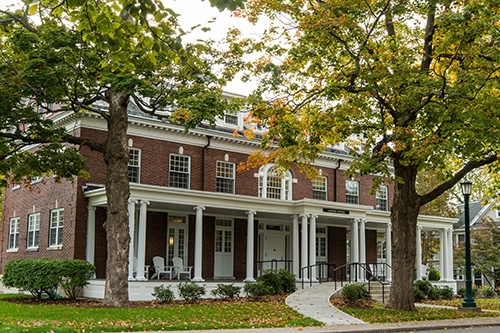Faculty Organizer: Karen Brison (Anthropology);
brisonk@union.edu (518) 388-6673
In fall of odd numbered years, Prof. Brison will take ten students to the Pacific Island nation of Fiji. The term is open to students of all majors. The term will introduce students to the process of doing anthropological research, and the cultures of Pacific Islands, as well as giving them a hands-on experience in schools. Fiji, as a developing Pacific Island country, offers a strong local cultural setting while at the same time giving ample material on the relationship between educational systems and society. English is the second language of most Fijians so students can conduct research in English. A midterm break includes the chance to visit other areas of Fiji.
Students will take two anthropology courses with Prof. Brison, both of which carry WAC credit: ANT 285T (Peoples of the Pacific); ANT 226T (Education and Culture). The third credit, ANT 499T will be given for an independent project on a topic of the student’s choice. Hands-on research is emphasized. Students will be immersed in the local culture. Anthropologists feel that it is important to live with members of another culture and to be actively involved in their day-to-day life. To truly understand how people see the world, you must “walk in their shoes,” ideally through participating in a venture of common interest together. Students will learn this method both through living with a Fijian family and through working 10-12 hours a week in a classroom to gain a thorough appreciation of social and cultural forces that shape everyday life and schools in Fiji.
After an initial orientation week, students will be placed with individual host families spread throughout the capital city of Suva. Students will meet together and with Prof. Brison two days a week for classes and discuss their experiences and readings on Fiji and on education and culture. Students will do readings about educational systems and how they are shaped by, and in turn shape, society and culture. Students will carry out structured exercises every week, and will design one longer project of their own choosing in the second half of the term.
We go on a weekly fieldtrips, often involving activities such as snorkeling, scuba diving, and river rafting. We will also take one or two longer fieldtrips to neighboring Pacific Island countries or to other areas of Fiji.
Eligibility
- An overall cumulative average of 2.5 at the time of application.
- Certification by the Dean of Students that the student is well prepared to participate in foreign study.
- Be in good academic standing and have a cumulative GPA of at least 2.5 for the term prior to the program.
- students must take at least one anthropology course before going to Fiji; this can be taken after being accepted into the term. Introduction to Cultural Anthropology (ANT 110) and Qualitative Methods (ANT 363), offered in Spring term, are good choices

